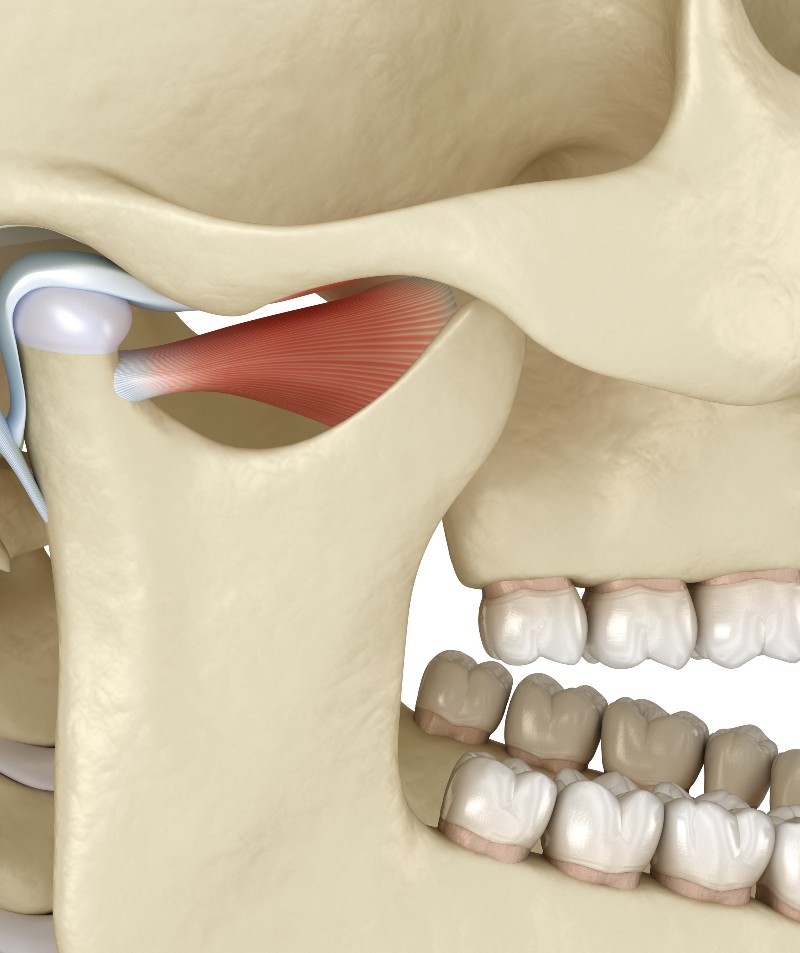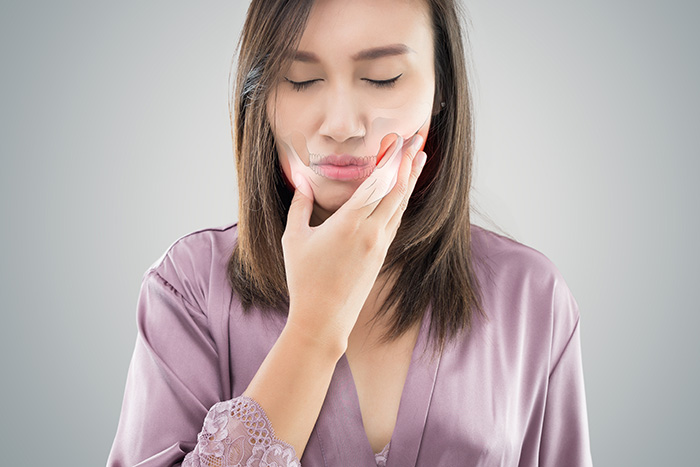
TMJ Treatment


What is TMJ?
TMJ stands for temporomandibular joint, which is the joint that connects your lower jaw to your skull and upper jaw. When inflamed, TMJ disorder (or TMD) can occur and often manifests as jaw clicking, soreness, tension or lock jaw. This pain and discomfort can also be severe enough to prevent you from chewing and speaking with ease. But at South Hills Dental Arts, we have several drug-free and non-invasive treatment options to help you find relief.
The TMJ Treatment Process
Initial Consultation & Diagnosis
From teeth grinding to arthritis, the causes of TMJ disorder can vary. The first step in finding long-term relief is to see our highly-trained dentists for a proper diagnosis. Once we understand what’s causing your TMJ pain, we can develop a treatment plan that works for you.
Developing Your Treatment Plan
After your comprehensive exam, we’ll start working on a custom treatment plan. This could include:
- Anterior Guide Plane
- Equilibration
- Splint
- Botox Treatments
- Night Guards
- Cortisone Shots
- Anti-Inflammatory Medication
Lifestyle Changes & Physical Therapy
Your treatment plan may include recommendations on lifestyle changes and at-home physical therapy that can help improve your jaw’s range of motion and ease your TMJ disorder symptoms. Our team will discuss these recommendations with you during treatment planning to ensure they’re manageable for you.




3D Tek Scan Experience
After gently biting down on an ultra-thin sensor, our Tek system will analyze your mouth to create 3D images of your bite and jaw pressure. This data allows your South Hills Dental Arts dentist to outline the exact treatment required to alleviate your jaw pain.
TMJ Treatment Benefits
Pain Relief
With non-invasive TruDenta technology, our team can provide relief from pain and inflammation on the very first visit.
Improved Jaw Function
An essential part of healing is ensuring that you regain a full range of motion and your quality of life.
Relaxation Techniques
Stress is a common cause of TMJ disorder. We’ll equip you with a variety of relaxation techniques to help you live pain-free.
Discover The Difference
Changing Smiles, Changing Lives
Veneers
Dr. Yousef started with bite therapy and then went into study models, provisional staging, and then finals. The results? A beautiful new smile for this awesome patient!


Implants
To restore this patient's smile back to its true form, Dr. Yousef placed several implants. Dr. Yousef then completed mounted models as well as provisional crowns and final crowns.


Crowns and Bridges
Dr. Johnson placed 6 upper anterior crowns, completely restoring this patient's severely decayed and broken smile.


Snap-In Dentures
This patient came to Dr. Johnson with an upper partial and a variety of ill fitting and failing crowns. A set of snap-in dentures on the patient's upper arch restored their health to its peak form.


Snap-In Dentures
Broken and missing teeth kept this patient from smiling with confidence. Dr. Johnson was able to renew the natural form and function of their smile with a set of snap-in denutres on their upper arch.


Snap-In Dentures
Before coming to our office, this patient struggled with failing teeth, recession, and bone loss. With a set of upper and lower snap-in dentures, Dr. Johnson was able to completley restore their smile.Before coming to our office, this patient struggled with failing teeth, recession, and bone loss. With a set of upper and lower snap-in dentures, Dr. Johnson was able to completley restore their smile.


Frequently Asked Questions
TMJ pain and jaw problems can begin due to a variety of different factors. For instance, bruxism (or teeth grinding) which is a common cause of TMJ pain, is often triggered by stress. Other causes include:
- Trauma to the temporomandibular joint
- Bite and alignment issues
- Lifestyle choices, such as excessive gum chewing
- Inflammatory and autoimmune disorders, like arthritis
Because of the variety of causes, it’s important to see an experienced team to get a proper diagnosis and to treat the underlying cause of your TMJ issue.
TMJ disorder can be diagnosed by using a combination of diagnostic methods. Most often, you’ll need a physical examination to find any tenderness, clicking or popping sounds, or limited mobility of the jaw. Your dentist will perform an in-depth review of your symptoms and understand how long you’ve been experiencing them. We may also recommend x-rays, CT scans, or a bite analysis to identify the root cause of your pain.
It’s important to acknowledge that pain is not normal, and TMJ issues typically don’t get better on their own. Before things get worse, contact South Hills Dental Arts for a consultation and get back to a functional, pain-free life.
Temporomandibular joint disorder, commonly known as TMJ, is a condition that affects the joint connecting your jaw to your skull. It can cause a range of symptoms, from jaw pain and difficulty chewing to headaches and earaches. The question of whether TMJ will go away on its own is a common one, but the answer isn't straightforward.
Some cases of TMJ can improve without treatment, especially if they're caused by temporary factors like stress or a minor injury. However, for many people, TMJ is a chronic condition that requires ongoing management. It's also worth noting that even if your symptoms do improve on their own, they may return if the underlying cause of your TMJ isn't addressed.
Managing TMJ pain often involves a combination of at-home remedies and professional treatment. At home, you can try things like eating soft foods, using heat or cold packs on your jaw, and practicing relaxation techniques to reduce stress. Over-the-counter pain relievers can also be helpful.
In terms of professional treatment, there are several options available. Physical therapy can be beneficial for many people with TMJ, as it can help to improve jaw function and reduce pain. Dental treatments like bite guards or orthodontics can also be effective, especially if your TMJ is caused by issues with your bite or jaw alignment.
In some cases, more invasive treatments like surgery may be necessary. However, these are usually considered as a last resort, and most people with TMJ can manage their symptoms effectively with less invasive treatments.
If left untreated, TMJ can lead to a number of complications. The most immediate of these is likely to be an increase in your symptoms. You may find that your jaw pain becomes more severe, or that you start to experience additional symptoms like headaches, earaches, or difficulty chewing.
Over time, untreated TMJ can also lead to more serious issues. It can cause permanent damage to your jaw joint, which can result in chronic pain and potentially even affect your ability to open and close your jaw. It can also lead to issues with your teeth, as the increased pressure on your jaw can cause them to become worn or damaged.
In addition, untreated TMJ can have a significant impact on your quality of life. It can make it difficult to eat or speak comfortably, and the constant pain can be very distressing. It can also interfere with your sleep, which can have a knock-on effect on your overall health and well-being.
In short, while it's possible that your TMJ symptoms may improve on their own, it's not something you should count on. If you're experiencing symptoms of TMJ, it's important to seek professional help to ensure that you're managing the condition effectively and preventing any potential complications.
Several lifestyle changes can help alleviate TMJ symptoms. These include practicing good posture, especially while working at a computer or looking at your phone, as poor posture can strain the neck and jaw muscles. Avoiding chewing gum and hard or chewy foods can also reduce stress on the jaw. Additionally, exercises that strengthen and relax the jaw muscles can be beneficial. Your dentist can recommend specific exercises based on your condition.




.webp)